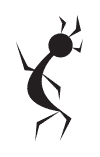My father preferred birds over squirrels,
strung the feeders from a wire hung
between two trees. We watched them leap
mid-scamper and catch the perch and
hold on to scarf down the seed.
My father cursed their furry hides and
vowed to end their plied trade.
They worked hard but spilled more than
the finches and their thistles. My father
shooed them away and grew weary of
their filth, their defiant rodent manners,
and when one finally gnawed through
the plastic at the bottom, my father’d
had it. He declared a feud.
He brought home the Crosman and
showed me how to pump it and prop it
against the jamb of the sliding glass
door. We nailed corn cobs to the trees
to lure them into the open. Then we’d
send them scrambling back to
the woodpile, back to their dark drey.
We took out the grackles too
after a while. My father said they ate
more than their share and crowded
out the cardinals. If you were alive
in my father’s backyard, it was
important to know what side of
the moral divide you landed on.
Anything that upset his plan for
distribution should have been wary.
No creature should have dared to make
him face an Ohio winter at the nursery
where he would have to buy more on
special. I was his accomplice in guarding
the seed. I took aim, and I squeezed.
I knocked the fur off a few, then
one day hit one clean as it toppled
down the side of the oak. I ran outside
to watch it bleed. It didn’t move, but
breathed and glared at me — Big Man
Squirrel Hunter — like we were in a movie,
playing out a hokey death scene.
My father kept to his convictions
about anything that crossed him.
I’d lost a little faith in my possessions.
Sure, he knew better how to stake a claim,
and if I didn’t know, I’d learned,
I’d never have the right kind of mean
to keep what I thought was mine.

